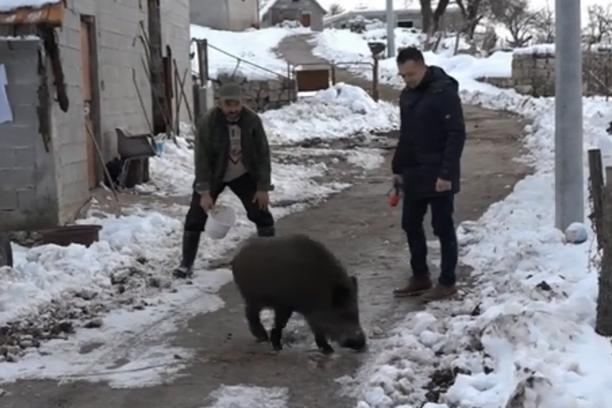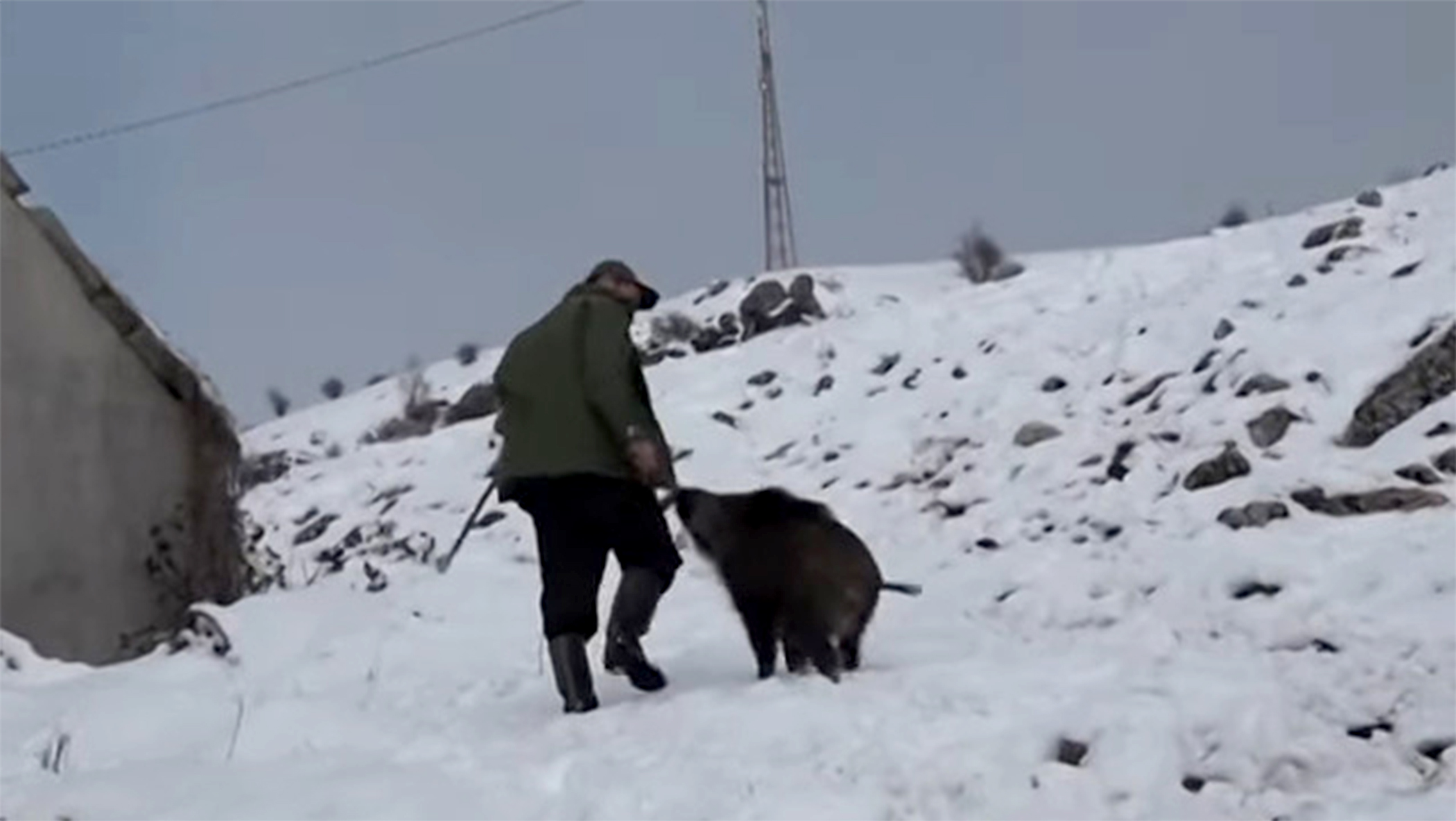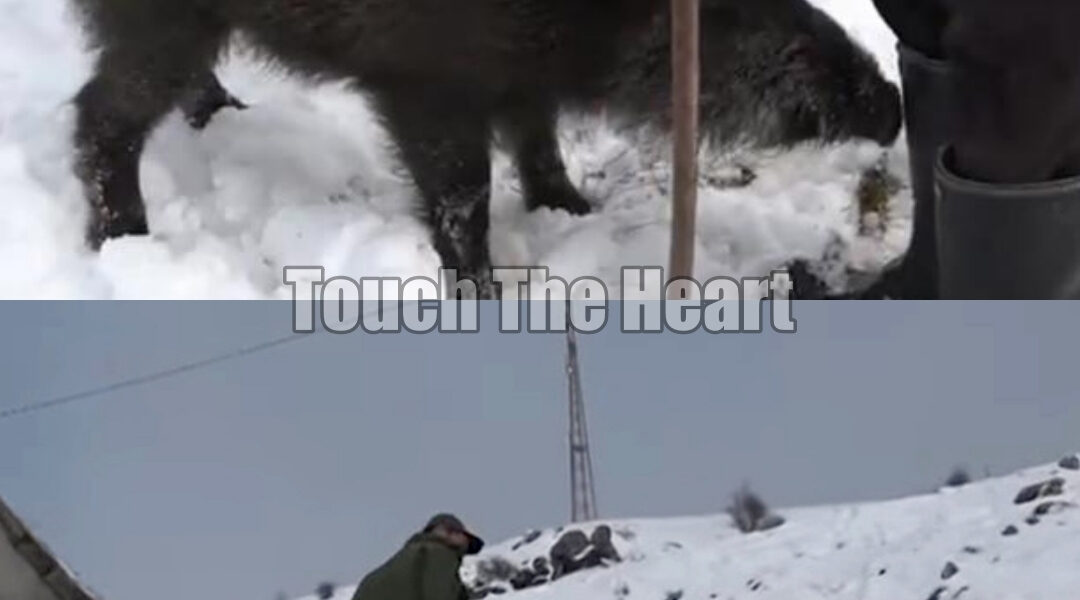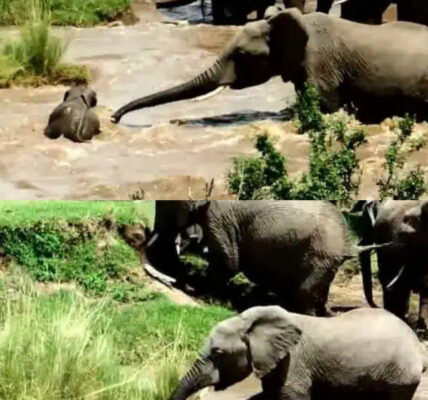In the quiet village of Avtovac, tucked between fields and forests, lived a man named Slavko Milović — a hunter by trade, a man of habit, and a man who had spent most of his life taking from the wild rather than giving to it.
But all of that changed the day he met a wild boar he would later call Tito.

It began one autumn morning. The forest was damp, the air heavy with the smell of pine and rain. Slavko had gone out with his rifle, as he had done countless times before. But as he moved through the trees, he heard a faint rustle — not the movement of prey, but the cry of something small, frightened, and alone.
There, tangled in a thicket, was a baby boar. It couldn’t have been more than a few weeks old. Its tiny frame shook as it struggled to free itself.
Slavko lowered his gun.
Something in him — perhaps pity, perhaps instinct — made him kneel instead. He reached down, untangled the little creature, and expected it to run. But it didn’t. It just stood there, trembling, staring up at him with wide, black eyes.
That day, the hunter carried his “catch” home in his arms.

He named him Tito, half-jokingly at first, after a figure of strength and stubbornness. But the name fit. Tito grew quickly, his small snout turning into a proud, broad face, his legs thickening, his steps firm and fearless.
He followed Slavko everywhere — through the fields, around the yard, even into the garden where he would nibble on corn and apples like a spoiled child.
Slavko laughed at his antics but never forgot the first day they met — the day a hunter chose mercy instead of instinct.
“I’ve hunted all my life,” he once said, “but I’ve never met an animal smarter, or more loyal, than Tito.”

The two became inseparable. Tito would wander the nearby hills but always return at the sound of Slavko’s whistle — trotting proudly, as if to report that he was still his friend. He was protective, gentle, and calm, more like a loyal dog than a wild boar. And Slavko, the man who once saw animals as trophies, now saw them as companions.
Neighbors would often stop by just to watch them — the hunter and the boar, walking side by side like old friends. Children would laugh as Tito followed Slavko through the fields, his snout brushing against the man’s arm.
When people asked if he was afraid the boar might one day return to the wild, Slavko only smiled.
“If he wants to go,” he said, “he’s free to go. But I don’t think he will. True friends stick together.”

Tito wasn’t the only one in Slavko’s care. Not long after, he brought home a female boar named Jorgovanka — shy, younger, and curious. The two became companions, and before long, Slavko began to suspect that Tito’s “family” might soon grow.
He joked about it, saying, “They spent the winter together… I think I’ll have little Titos running around soon.”
His eyes would light up when he spoke of them — the same eyes that once looked through the scope of a rifle now softened with affection. His farm was still a place of work, but it had changed — it breathed now, full of laughter, grunts, and the rhythmic sounds of hooves on soil.

“I wouldn’t sell Tito for all the money in the world,” Slavko often said.
And he meant it.
He had once gone into the forest searching for something to hunt — and found instead something to keep his heart alive.
What started as curiosity turned into a friendship that challenged everything he thought he knew about animals, about ownership, and about love.
Tito wasn’t a pet. He was a reminder — that gentleness can exist where violence once lived, and that even the wildest creatures can return loyalty when given trust.
Years later, people in Avtovac still tell the story of the man and his boar — how a hunter laid down his rifle and found a friend. They say you can still hear Slavko’s whistle echoing through the fields, followed by the sound of hooves trotting behind him, steady and sure.
And maybe that’s the lesson Tito left behind — that sometimes, the wild doesn’t need to be tamed.
It just needs to be understood.
Because in a world where taking often comes easier than giving, one man chose differently.
And in return, the wild gave him something back —
a friend for life.




